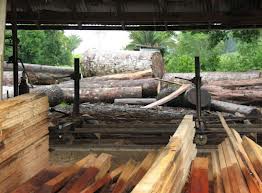
The Apremdo-Kwesimintsim Wood Workers Association in the Sekondi-Takoradi Metropolis of the Western Region has called on government to enforce the law on quota supply of lumber by sawmills to local markets.
The association noted that the policy framework for procurement and quality control of timber products in the domestic market is fragile, even though section 22 of the Public Procurement Act, 2003 (Act 663) requires that only certified sawn lumber from recognised sawmills are allowed for use in the projects of Ministries, Departments and Agencies (MDAs).
Mr. Thomas Cudjoe speaking to the B&FT in an interview explained that Ghana is the first country to enter into the Voluntary Partnership Agreement (VPA) with the European Union. Even though the VPA is mainly a trade agreement concerned with legality of timber exported to the EU, it also involves legality of timber traded in the domestic market.
He said under article 20 of the Agreement, each party is under obligation to submit an annaul report including actions taken to prevent illegally-produced timber products from being exported to non-community markets or traded on the domestic market.
“This means that Ghana cannot pursue measures to ensure the trade of legal timber to the EU without meeting obligations to ensure that the domestic market also trades legal timber,” he said. According to him, the Forest and Wildlife Policy of 1994 also makes explicit provisions for supplying quality and adequate industrial timber to the domestic market.
He said the Timber Resource Management Act (Act 547) and LI 1649 further gave legal backing to the policy aspiration by authorising the minister responsible for forestry, from time to time, review the situation and give directives for the supply of industrial timber to domestic markets.
At the moment, he said, the prevailing directives are that some sawmills be given special permits to process timber solely for the domestic market and for Trades Union Congress members to supply 20% of their production to the domestic market.
Mr. Cudjoe said, currently, about 84% of lumber available on the domestic market is supplied by chainsaw operators -- it has to be established here that perhaps the most difficult impact of a full VPA regime will be the volume of timber that can possibly be available to lumber traders for trade on the domestic market.
“This is because legality standards require that timber exploitation should be within official annual allowable cut limits, and that no illegal logging or milling should be permitted,” he pointed out.
He also pointed out that some of the challenges likely to confront industry players and traders if measures are not put in place to mitigate them are: loss of employment and livelihood, shortage of some species of lumber on the domestic market, and delays in receiving supplies -- thus locking up the capital of traders.
Also, he said, high start-up capital -- since sawmills mostly require full payment before consignments are delivered -- high prices of sawmill lumber, perpetration of chainsaw activities, as well as extortion of moneys from lumber traders by enforcement agencies are also some of the challenges.
Therefore, he recommended that government and other agencies involved in the VPA agreement must as a matter of priority and urgency address local problems involved in the domestic lumber trade.
“The inadequate lumber supply by sawmills on the domestic market must be properly addressed. For this reason, the current regulations on the supply of lumber to the domestic market must be fully enforced -- and even adopt measures to give priority for the domestic lumber supply,” he said.
He noted that the high prices of lumber from sawmills is also a disincentive to traders in the product, and this can be partly attributed to the high price in the export market.
He concluded that to ensure the successful implementation of the agreement, measures must be put in place by the government to protect traders and consumers from such high prices.